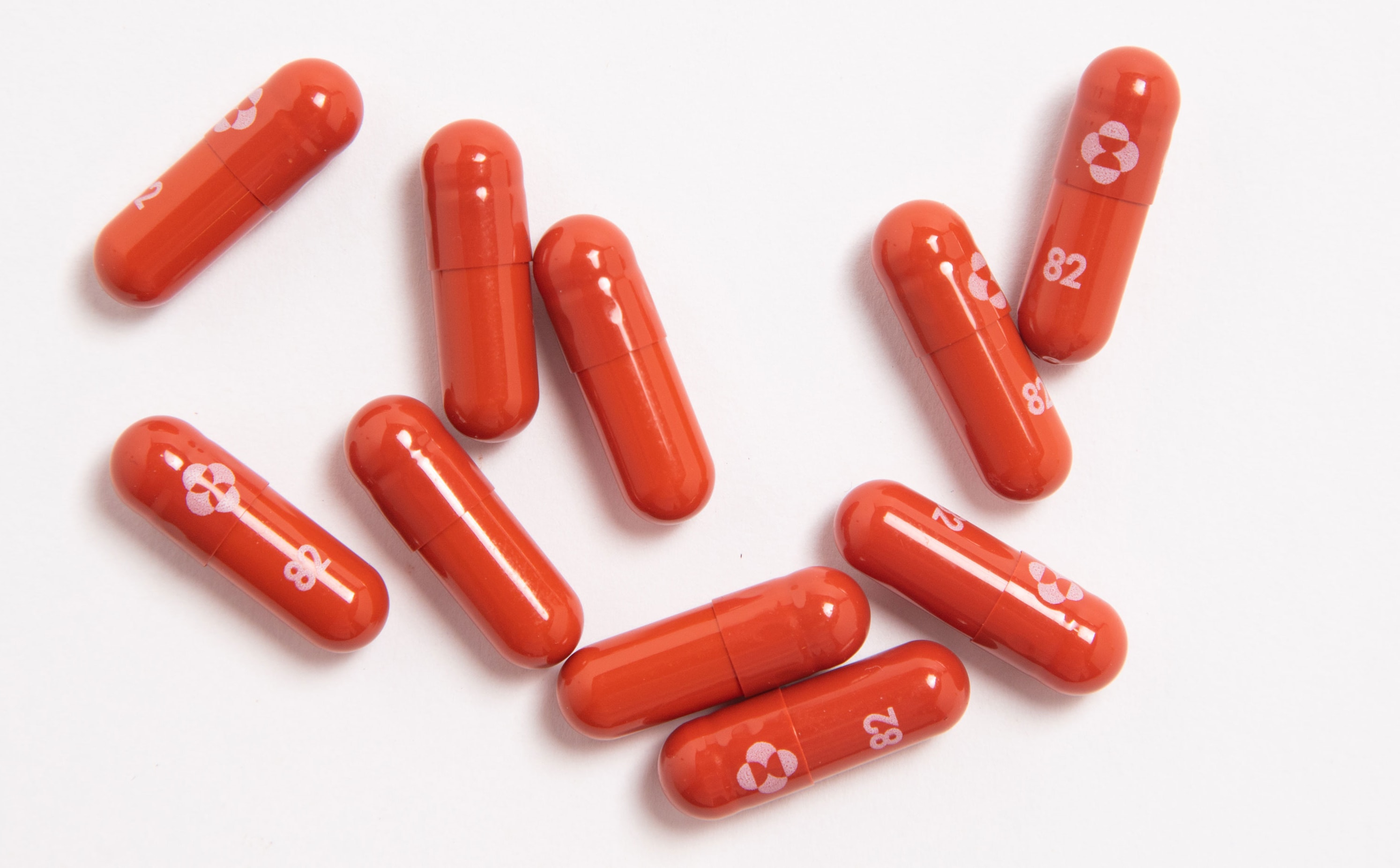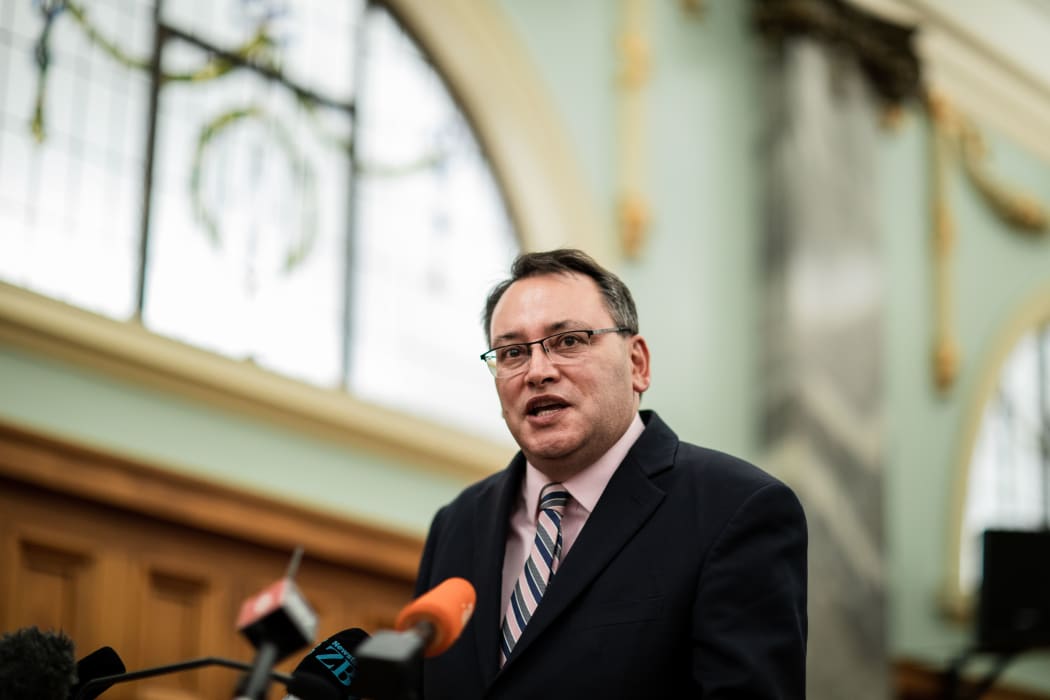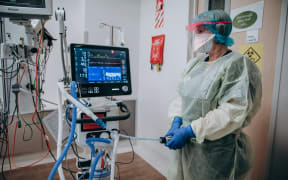Covid-19 antiviral pills show promise, but experts warn they are unlikely to be available to help as the virus spreads through traffic-light New Zealand.

Molnupiravir is the first oral antiviral treatment for Covid to report clinical trial results. Photo: Merck
The traffic light system - officially dubbed the Covid Protection Framework - is a shift in strategy from elimination to suppression of Covid-19.
It will mean tolerating some community spread of the virus throughout New Zealand and relying on vaccines and public health measures to manage the spread and keep New Zealand's health system from being overwhelmed.
Worst-case scenarios predict up to 16,000 new cases per week in January, and as DHBs brace for an influx of cases beyond Auckland, Health Minister Andrew Little says oral anti-viral medicines will play a critical role in the response.
"We know that a lot of the treatments at the moment require an injection, but actually new treatments that are emerging - molnupiravir and the new Pfizer therapeutic treatment - are taken orally, so people can actually get a prescription and administer it themselves," Little says.

Health Minister Andrew Little Photo: RNZ / Samuel Rillstone
"That will take a lot of pressure off the hospital system as well."
Infectious Disease physician and professor of biochemistry at Otago University Kurt Krause says early data for these pills are promising.
"The data that they've released look quite good where they're seeing some very significant reductions in hospitalisations and very significant reductions in mortality if these medications are used early during a Covid infection," he says.
However, he says the process for getting such drugs approved for safety in New Zealand through Medsafe, and supplied through Pharmac, can take several months.
"Even in a favourable case it's looking more likely that it will be early in next year before we're able to roll these medicines out even if everything goes smoothly. If there are any hiccups it can take even longer," he said.
"It means during the initial period where things open up, and the number of cases rise we might not have those treatments available."
Medsafe says it is awaiting an application with supporting data for molnupiravir, and while there is a Pharmac deal to supply some 60,000 courses of it, that deal is conditional on Medsafe's approval.
Paxlovid, Pfizer's new oral drug, has performed even better in early trials, but having been developed later is even further behind in the approvals process.
Pharmac chief executive Sarah Fitt said paxlovid was among treatments being assessed by its Covid-19 expert clinical advisory group. Medsafe is yet to make any announcements about the drug.
Another treatment closer to being approved for Covid use is ronapreve, which has been under consideration by Medsafe since September. Medsafe says it is being treated as a priority, but is waiting on additional information it has requested from the manufacturer.
National Party health spokesperson Shane Reti, a former GP, warns even if the treatments get Medsafe approval, there might not be enough to go around.
"I think we've been late-ish to actually get these into New Zealand. Once they get here it's not clear to me there is urgency from Medsafe in getting these approved, and also not clear we've got numbers that if we get a really severe progression of our current outbreak that we're going to manage well.

National Party health spokesperson Shane Reti Photo: RNZ / Samuel Rillstone
"Molnupiravir, 60,000 doses, that's twice a day, so that's 30,000 days, ronapreve is 5300 infusions, only 500 of the baricitinab, so we're kind of thin for these frontline treatments for coronavirus.
"I don't have confidence that we'll have them by the end of this year but nor do I have any projected timeframe as to when we might expect them. All I would say is that we need to indicate urgency."
However, Prof Krause cautions against rushing into approvals without having done the scientific groundwork.
"It's hard to tell people that they need to wait and go through the process but it's actually really really important ... I can remember that everybody was very excited about a combination of two drugs in HIV and everybody said 'oh don't worry about the publications'.
"When the papers came out it turned out that those two medicines used together interfered with one another ... if we hadn't done the science we would have made a mistake."
He says vaccines and public health measures remain the best protection for now.
"Certainly in general throughout this entire Covid period, vaccination is the number one way to prevent Covid - vaccination, and following public health measures and then add on to that the idea of getting a booster."
This was a point brought home by Medsafe group manager Chris James.
"It ought to be noted, the Covid-19 vaccine remains our number one protection against the virus. The vaccine is safe, it will help to stop you and your loved ones getting seriously ill, and it could save your life and theirs."
Antivirals
These drugs are to be taken early in the infection. They are not thought to be effective for patients who have already gone into hospital.
They would be more useful if there is widespread access to Covid-19 tests which can catch the virus early, so the drugs can stop it in its tracks before it leads to hospitalisation.
However, rapid antigen tests - which could prove useful in widespread surveillance monitoring - would likely be less effective for this, because they are less effective at detecting the virus early in the infectious period.
Oral versions would increase availability and accessibility, allowing people to get a prescription as soon as they started feeling ill, to reduce the risk of severe disease.
The US has already purchased millions of doses of two such pills - molnupiravir and paxlovid - in anticipation of their authorisation. Both showed a lot of promise in early trials, which were stopped early because it would be unethical to continue giving placebo to the control group.
Both are most beneficial when taken within five days off symptom onset.
Crucially, no patients who took either drug died in the studies.
Molnupiravir
This pill is designed to be taken twice a day, and works by introducing errors into the genetic code of the virus.
Results so far are promising, but the United States' Food and Drug Administration (FDA) is yet to approve it, with consideration set down for 30 November.
Early but incomplete data suggested the drug reduced risk of hospitalization or death by about 50 percent compared to a placebo.
Researchers were asked to stop their Phase III trial of about 400 patients early because it would have been unethical to continue giving placebos, and the trial showed no major side effects.
Invented by not-for-profit biotech company Drug Innovations at Emory and named after Mjölnir, the hammer of Thor, molnupiravir is supplied by Merck Sharp & Dohme (MSD) with Ridgeback Therapeutics.
New Zealand was one of the first countries in the world to secure a deal for the supply of the drug in early October, but Pharmac's agreement with the supplier is conditional on Medsafe approval.
Medsafe says it has had discussions with MSD, and is awaiting an application with data supplied by the company, but doctors can prescribe it under certain circumstances.
MSD, which has offices and factories in New Zealand, has said it will license drugmakers worldwide to be able to produce the pill.
Studies on the drug are yet to be peer reviewed.
Paxlovid
Pfizer's Covid-19 antiviral pill paxlovid is similar to molnupiravir but works slightly differently, with three pills taken twice a day for five days.
Early studies showed it reduced risk of hospitalisation by about 89 percent for patients treated within three days of symptoms and 85 percent for patients treated within five days.
This trial was in unvaccinated patients, and studies have not yet been completed on vaccinated individuals, creating controversy in the US with doctors saying they would give it to vaccinated patients regardless.
Pharmac says it is talking to Pfizer about supply of paxlovid, and its Covid-19 clinical expert advisory group is looking at the evidence for it and other treatments.
Medsafe says it is "closely monitoring the developments of Covid-19-related pharmaceuticals overseas, seeking expert advice, and receiving regular updates from other medicines regulatory counterparts", but no progress on paxlovid has yet been announced.
Pfizer has made a deal with a UN-backed not-for-profit which would allow the pill to be made and sold in 95 developing nations, making it available to 53 percent of the world's population.
Remdesivir
Remdesivir is an intravenously administered antiviral drug made by Gilead, which was originally developed for hepatitis C, then used for Ebola.
Pharmac has secured additional stock specifically for treatment of Covid, but while it has been approved by Medsafe for use in New Zealand, it has not yet been approved to treat Covid-19.
Sharon Lewin, an infectious disease researcher and director of the Doherty Institute, told the ABC the drug's effectiveness is not spectacular.
"It gives you a little bit of time, it reduces your time in hospital and may potentially have a small mortality benefit, but it's not dramatic."
While some studies have shown a benefit, two trials did not show a clear benefit. On the other hand, a trial combining it with another drug - baricitinib - has shown greater effect than using remdesivir alone (see baricitinib, below).
Monoclonal antibodies
Monoclonal antibody drugs have previously been used to treat diseases such as arthritis and cancer.
They are more useful for preventing serious illness from Covid-19 in people who are at higher risk due to things like asthma, kidney or lung disease, obesity or diabetes.
Ronapreve
Also known as REGEN-COV, ronapreve is a new monoclonal antibody drug developed specifically for treating Covid-19. It is a combination of two drugs - casirivimab and imdevimab.
They work by attaching to the spike proteins of the virus, preventing it from entering cells, which stops the virus from replicating.
It can be administered by IV drip, as early in infectious period as possible, to reduce severity of the disease and the chance of needing to go to hospital.
It has been funded by Pharmac and is awaiting assessment by Medsafe, which in turn has requested additional information from the manufacturer.
"The timeframe to complete assessment depends on how quickly Medsafe receives a response," Medsafe group manager Chris James says.
Prof Kraus has quoted studies showing it can prevent 70 percent of infections following exposure and 90 percent of symptomatic infections, and reduce mortality (deaths) by at least 80 percent or higher.
A study has also shown promise with injection under the skin (subcutaneously) in four areas of the body to reduce the risk of people who have been exposed to Covid-19 (e.g. household contacts) going to hospital or dying.
Scientists are also working to develop long-acting versions.
Sotrovimab
Another monoclonal antibody drug, made by GlaxoSmithKline, it is administered as an intravenous injection.
In trials, just 1 percent of people treated with Sotrovimab went to hospital or died, compared with 7 percent of cases in the placebo group.
In the US and EU, the drug has been approved for 'emergency use' - for people at high risk of severe Covid-19. Australia had it approved and available for use by mid-August.
The drug has not been funded by Pharmac, nor has it been approved by Medsafe, despite calls for this to be done urgently since September.
Common side effects include rash and diarrhoea.
Anti-inflammatories
Anti-inflammatory drugs are useful for reducing severe symptoms when patients already have a severe case of the Covid-19.
Some of them have already been available for use in treating other conditions which lead to inflammation.
They typically work by preventing sepsis from causing damage to internal organs by reducing the body's immune response, but this means using them too early - during the viral phase of the disease - might reduce the body's ability to fight the disease.
"This dysregulated immune response can be as harmful as, or more harmful than, the pathogens themselves," studies show.
Tocilizumab
Tocilizumab is an immunosuppressive anti-inflammatory drug, previously used mainly to treat arthritis. It is administered intravenously (by IV drip).
It has been approved by Medsafe for use in New Zealand, but not to treat Covid-19, although Pharmac has expanded its funded access to include use for Covid-19.
However, due to its use in treating Covid-19 worldwide, global demand has led to interrupted supplies. In September, supplier Roche cancelled its deliveries through to January.
"We have sought advice from clinical experts and are now exploring possible alternative treatments and how we can preserve the stock we have. In the meantime, we will be asking prescribers to not start any new patients on tocilizumab," Pharmac said in a statement in early September.
"We are informing tocilizumab prescribers and its users about the shortage. We will be sharing what actions can be taken to minimise the impact to New Zealanders. We will continue to update people as the situation evolves."
From 1 December 2021, additional pharmacodes of alternative tocilizumab stock will be supplied to New Zealand and able to be prescribed under Section 29 of the Medicines Act.
Baricitinib
Also sold as "olumiant", baricitinib is an oral tablet previously used for rheumatoid arthritis. It is a type of immunosuppressant called a Janus kinase (JAK) inhibitor.
A study in the Lancet showed a 38.2 percent relative reduction and 5 percentage points absolute reduction in deaths within 28 days in Covid-19 patients. This was very strong results compared to dexamethasone (17% relative, and 2.8% absolute reduction) and tocilizumab (15% relative, 4% absolute reduction).
Other scientific trials show treatment using baricitinib alongside remdesivir were more effective at reducing symptoms than with remdesivir alone.
Pharmac has approved funding for about 500 courses from 5 November, but the drug is not yet approved by Medsafe.







